unit2 单词和课文翻译
人教版小学四年级上下册英语课文翻译及单词后全
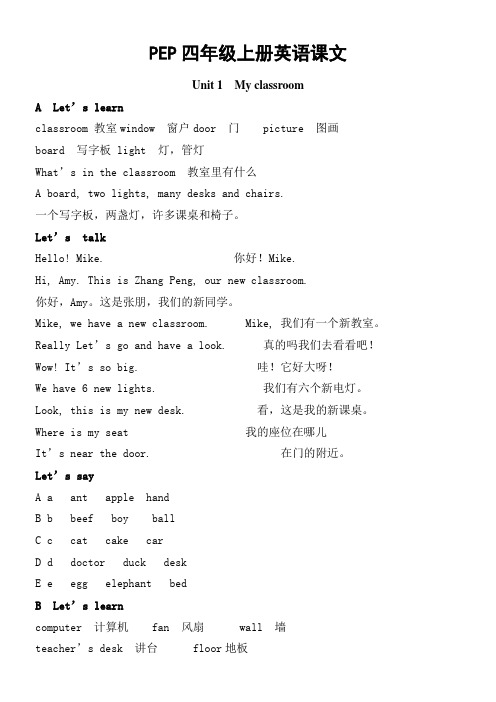
PEP四年级上册英语课文Unit 1 My classroomA Let’s learnclassroom 教室window 窗户door 门picture 图画board 写字板 light 灯,管灯What’s in the classroom教室里有什么A board, two lights, many desks and chairs.一个写字板,两盏灯,许多课桌和椅子。
Let’s talkHello! Mike. 你好!Mike.Hi, Amy. This is Zhang Peng, our new classroom.你好,Amy。
这是张朋,我们的新同学。
Mike, we have a new classroom. Mike, 我们有一个新教室。
Really Let’s go and have a look.真的吗我们去看看吧!Wow! It’s so big.哇!它好大呀!We have 6 new lights. 我们有六个新电灯。
Look, this is my new desk. 看,这是我的新课桌。
Where is my seat 我的座位在哪儿It’s near the door.在门的附近。
Let’s sayA a ant apple handB b beef boy ballC c cat cake carD d doctor duck deskE e egg elephant bedB Let’s learncomputer 计算机fan 风扇wall 墙teacher’s desk 讲台floor地板Look! This is my classroom. The wall is white. The floor is green.看,这是我的教室,墙是白色的,地板是绿色的。
Let’s talkGood morning! Let’s clean the classroom.早上好!我们打扫教室吧!Good idea! 好主意!Let’s clean the desks and chairs. 让我们打扫课桌和椅子吧。
unit 2单词课文翻译(有)

Unit21.castle/'kɑ:-sl/n.城堡;堡垒2.apply/əˈ-p-laɪ/ vi.& vt.申请;请求 vt.应用;涂(油漆、乳剂)3.apply for申请;4.visa/'vi:-zə/n.签证5.rent/ren-t/vt.租用;出租vi.租用;租金为n.租金6.pack/pæ-k/vi.&vt.收拾(行李) vt.包装n.(商品的)纸包;纸袋;大包7.amazing/əˈ-meɪ-zɪŋ/ adj.令人惊奇的;令人惊喜的8.amazed/əˈ-meɪ-zd/ adj.惊奇的;惊喜的9.arrangement/əˈ-reɪn-dʒ-mənt/ n.安排;筹备10.extremely/ɪkˈs-tri:-m-li/ adv.极其;非常11.source/sɔ:-s/n.来源;出处12.narrow/'næ-rəʊ/adj.狭窄的vi.&vt.(使)变窄13.flat/f-læ-t/adj.平坦的;扁平的n.公寓;单元房14.powerful/ˈpaʊ-ə-f(ə)l/ adj.强有力的;有权势的;有影响力的15.empire/ˈem-paɪ-ə(r)/ n.帝国16.emperor/ˈem-pə-rə(r)/ n.皇帝17.site/saɪ-t/ n.地点;位置;现场18.take control of /teɪk-kənˈ-trəʊ-ləv/ v控制;接管19.official/əˈ-fɪ-ʃ(ə)l/ 官方的;正式的;公务的n.官员;要员20.recognise/ˈre-kə-ɡ-naɪ-z/ vt.辨别出;承认;认可21.type/taɪ-p/n.类型;种类vi.&vt.打字22.flight/f-laɪ-t/n.空中航行;航班;航程23.accommodation/ə'-kɒ-məˌ-deɪ-ʃn/n.住处;停留处;膳宿24.unique/ju'-ni:-k/adj.唯一的;独特的;特有的25.Path/pɑ:-θ/ n.小路;路线;道路26.destination/ˌde-s-tɪ-neɪ-ʃn/n.目的地;终点27.other than/ˈʌ-ðər- ðæn/除……以外28.admire/ədˈ-maɪ-ə(r)/ vt.钦佩;赞赏29.Architecture /ˈɑ:-kɪ-tek-tʃə(r)/ n.建筑设计;建筑学30.architect/ˈɑ:-kɪ-te-kt/ n. 建筑师;设计师,缔造者31.brochure /ˈb-rəʊ-ʃə(r)/ n.资料(或广告)手册32.package/ˈpæ-kɪ-dʒ/ 包裹;包装盒 vt.将……包装好33.package tour /ˈpæ-kɪ-dʒ- tʊr/ 包价旅游34.contact/'kɒn-tæ-kt/vt.联络;联系n.联系;接触35.civilisation/ˌsɪ-və-laɪˈ-zeɪ-ʃ(ə)n/ n.文明;文明世界36.make up /ˈmeɪ-kʌ-p/ 构成;形成37.soldier/ˈsəʊl-dʒə(r)/ n.士兵,军人38.transport/ˈtræn-s-pɔ:-t/ n.交通运输系统vt.运输;运送39.transportation/ˌtræn-s-pɔːˈ-teɪ-ʃn/ vt.交通运输系统40.hike/haɪ-k/vi.徒步旅行vt.去……远足n.远足;徒步旅行41.economy/ɪˈ-kɒ-nə-mi/ n.经济,节约42.economic /ɪˈ-kɒ-nə-mik/ adj.经济的,经济学的43.credit /ˈkre-dɪt/ n.借款,信用,学分,称赞44.credit card/ˈkre-dɪt -kɑ:-d/ n.信用卡45.detail /ˈdi:-teɪl/ n.细节;详情;细微之处46.check/tʃe-k/v.检查,核对;在……上打钩;47.check in(在旅馆、机场等)登记48.check out结账离开(旅馆等)49.request /rɪˈ-kwe-st/ n.(正式或礼貌的)要求;请求vt.(正式或礼貌地)要求;请求50.view /v-ju:/ n.视野;景色;看法51.sight /saɪ-t/ n.景象;视野;视力52.statue /ˈs-tæ-tʃu:/ n.雕塑;雕像53.BCE/ˌbi:si:ˈi:/(before the common Era)公元前54.tomb /tu:-m/ n.坟墓55.unearth /ʌnˈ-ɜ:-θ/ vt.挖掘,发掘ment /ˈkɒ-men-t/ n.议论;评论57.the Eiffel Tower /ðə-'aɪ-fl-ˈtaʊ-ə(r)/ 艾菲尔铁塔58.Neuschwanstein Castle / nɔɪ'-ʃ-va: n-ʃ-tain-ˈkɑ:-sl/新天鹅堡59.Iceland /ˈaɪs-lənd/ n. 冰岛(国家名)60.Disneyland /ˈdɪz-ni-lænd/ n. 迪斯尼乐园;61.Peru /pəˈ-ru:/n. 秘鲁(拉丁美洲国家名)62.the Andes Mountains/ðə-ˈæn-di:z-ˈmaʊn-tənz/ 安第斯山脉63.the Amazon rainforest /ðə-ˈæmə-zən-ˈreɪn-fɒ-rɪ-st/亚马孙雨林64.the Inca Empire /ðə-ˈɪŋ-kə-ˈem-paɪ-ə(r)/ 印加帝国65.Machu Picchu / ˌma:-tʃu:ˈ-pi:k-tʃu: / 马丘比丘66.Spain /s-peɪ-n/ 西班牙(国家名)67.Spanish/ˈs-pæ-nɪʃ/ n.西班牙人;西班牙语;adj.西班牙的68.Cusco /'ku:-s-kəu/ 库斯科(秘鲁城市)ke Titicaca /leɪk-,ti:ti'-ka:ka:/ 的的喀喀湖70.The Uros /ðə-ju:-rəʊ-z/ 乌鲁斯人71.the Terracotta Army /ðə-ˌter-əˈ-kɒ-tə-ˈɑ:-mi/ 兵马俑72.apply /ə'p-laɪ/ vi.&vt.申请;请求vt.应用;涂(油漆、乳剂)73.application /ˌæp-lɪˈ-keɪʃ(ə)n/n.应用;用途;申请74.applicant /ˈæp-lɪ-kənt/ n.申请人;求职人75.amazing /ə'meɪ-zɪŋ/ adj.令人惊奇的;令人惊喜的76.amazed /əˈ-meɪ-zd/ adj.惊奇的;惊喜的77.amaze /əˈ-meɪ-z/ vt.使吃惊;使惊讶78.arrangement/ə'-reɪn-dʒ-mənt/n.安排;筹备79.arrange /əˈ-reɪn-dʒ/ vt.安排80.extremely/Ik's-tri:-m-li/adv.极其;非常81.extreme /ɪkˈs-tri:m/ adj.极端的;极限的;非常的82.powerful/'paʊ-ə-fl/adj.强有力的;有权势的;有影响力的83.power/ˈpaʊ-ə(r)/ v.给……提供动力84.empire/'em-paɪə(r)/n.帝国85.emperor/ˈem-pə-rə(r)/ n.皇帝86.site/saɪ-t/n.地点;位置;现场87.take control of 控制;接管88.official/ə'-fɪ-ʃl/ adj.官方的;正式的;公务的n.官员;要员89.office /ˈɒ-fɪ-s/ n.办公室;政府机关;官职90.recognise /'re-kəɡ-naɪ-z/ vt.辨别出;承认;认可91.recognition /ˌre-kəɡˈ-nɪ-ʃn/ n.认出;认识92.transport /'træns-pɔ:t/n.交通运输系统vt.运输;运送93.transportation /ˌtræns-pɔ:ˈ-teɪ-ʃn/ 运输94.apply for 申请.95.take control of 控制;接管.96.look forward to 盼望.97.get ready for 对……做好准备.98.encourage sb to do sth. 鼓励某人做某事.99.spend some time doing sth. 花费时间做某事.100.a pply for 申请.101.t ake control of 控制;接管.102.o ther than 除……之外.103.m ake up 构成;形成.104.c redit card信用卡.105.p ackage tour 包价旅游.106.c heck in登记.107.c heck out结账离开.Reading and Thinking108.P ERU is a country on the Pacific coast of South America with three main areas: 秘鲁是位于南美洲太平洋沿岸的一个国家,由三个主要地区构成:109.narrow, dry, flat land running along the coast, 狭窄的、干燥的、平坦的沿海地区,110.t he Andes Mountains, and the Amazon rainforest.安第斯山脉和亚马孙热带雨林。
译林版六年级下册 Unit2(含中文翻译)

Unit 2 Story time①Wang Bing is a good boy. He has many good habits. He gets up early in the mor-ningand never goes to bed late. He brushes his teeth in the morning and before bedtime.王兵是一个好孩子。
他有很多好习惯。
他早上很早起床,并且从不很晚睡觉。
他在早上和睡觉前刷牙。
At home, Wang Bing always puts his things in order. He usually finishes his homeworkbefore dinner. 在家,王兵总是把他的东西整理得井井有条。
他通常在晚饭前完成他的家庭作业。
② Liu Tao is a good boy too. He listens to his teachers at school. He also does well athome. He keeps his room clean and tidy. He also helps his parents.刘涛也是一个好孩子。
他在学校听他的老师的话。
他在家也做得很好。
他保持他的房间干净和整齐。
他也帮助他的父母。
But Liu Tao has some bad habits. He often does his homework late at night and does notgo to bed early. He sometimes feels sleepy in the morning.但是刘涛有一些坏习惯。
他经常在晚上很晚的时候做他的家庭作业,并且不早点儿睡觉。
他有时在早上感到很困。
③Wang Bing and Liu Tao are friends. Wang Bing knows Liu Tao well.王兵和刘涛是朋友。
unit 2 English around the world课文及翻译
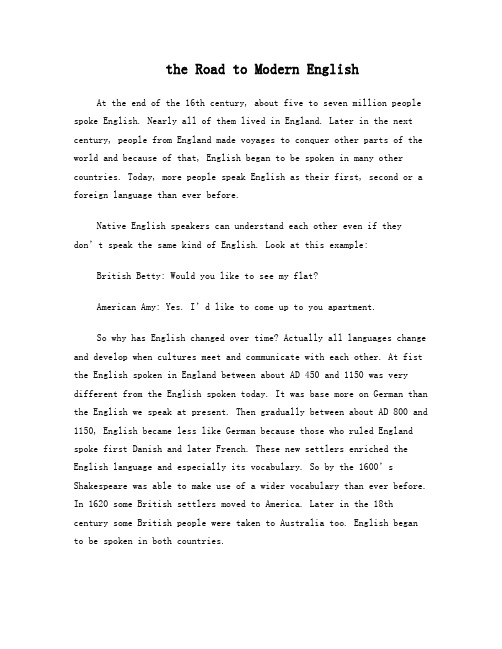
the Road to Modern EnglishAt the end of the 16th century, about five to seven million people spoke English. Nearly all of them lived in England. Later in the next century, people from England made voyages to conquer other parts of the world and because of that, English began to be spoken in many other countries. Today, more people speak English as their first, second or a foreign language than ever before.Native English speakers can understand each other even if they don’t speak the same kind of Engli sh. Look at this example:British Betty: Would you like to see my flat?American Amy: Yes. I’d like to come up to you apartment.So why has English changed over time? Actually all languages change and develop when cultures meet and communicate with each other. At fist the English spoken in England between about AD 450 and 1150 was very different from the English spoken today. It was base more on German than the English we speak at present. Then gradually between about AD 800 and 1150, English became less like German because those who ruled England spoke first Danish and later French. These new settlers enriched the English language and especially its vocabulary. So by the 1600’s Shakespeare was able to make use of a wider vocabulary than ever before. In 1620 some British settlers moved to America. Later in the 18th century some British people were taken to Australia too. English began to be spoken in both countries.Finally by the 19th century the language was settled. At that time two big changes in English spelling happened: first Samuel Johnson wrote his dictionary and later Noah Webster wrote The American Dictionary of the English language. The latter gave a separate identity to American English spelling.English now is also spoken as a foreign or second language in South Asia. For example, India has a very large number of fluent English speakers because Britain ruled India from 1765 to 1947. During that time English became the language for government and education. English is also spoken in Singapore and Malaysia and countries in Africa such as South Africa. Today the number of people learning English in China is increasing rapidly. In fact, China may have the largest number of English learners. Will Chinese English develop its ownidentity? Only time will tell.通向现代英语之路16世纪末期大约有5百万至7百万人说英语,几乎所有这些人都生活在英国。
2012人教版英语七年级上册课文及单词翻译2单元
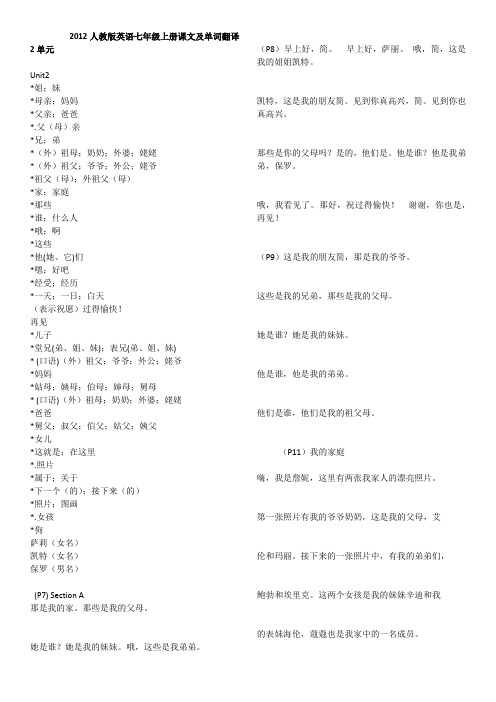
*儿子Βιβλιοθήκη *堂兄(弟、姐、妹);表兄(弟、姐、妹)
* (口语)(外)祖父;爷爷;外公;姥爷
*妈妈
*姑母;姨母;伯母;婶母;舅母
* (口语)(外)祖母;奶奶;外婆;姥姥
*爸爸
*舅父;叔父;伯父;姑父;姨父
*女儿
*这就是;在这里
*.照片
*属于;关于
*下一个(的);接下来(的)
*照片;图画
*.女孩
*狗
萨莉(女名)
(P9)这是我的朋友简,那是我的爷爷。
这些是我的兄弟,那些是我的父母。
她是谁?她是我的妹妹。
他是谁,他是我的弟弟。
他们是谁,他们是我的祖父母。
(P11)我的家庭
嗨,我是詹妮,这里有两张我家人的漂亮照片。
第一张照片有我的爷爷奶奶,这是我的父母,艾
伦和玛丽。接下来的一张照片中,有我的弟弟们,
鲍勃和埃里克。这两个女孩是我的妹妹辛迪和我
凯特(女名)
保罗(男名)
(P7)Section A
那是我的家。那些是我的父母。
她是谁?她是我的妹妹。哦,这些是我弟弟。
(P8)早上好,简。早上好,萨丽。哦,简,这是我的姐姐凯特。
凯特,这是我的朋友简。见到你真高兴,简。见到你也真高兴。
那些是你的父母吗?是的,他们是。他是谁?他是我弟弟,保罗。
哦,我看见了。那好,祝过得愉快!谢谢,你也是,再见!
的表妹海伦,蔻蔻也是我家中的一名成员。
2012人教版英语七年级上册课文及单词翻译2单元
Unit2
*姐;妹
*母亲;妈妈
*父亲;爸爸
*.父(母)亲
*兄;弟
*(外)祖母;奶奶;外婆;姥姥
*(外)祖父;爷爷;外公;姥爷
五年级英语上册素材-Unit2 Going to school课文翻译 沪教牛津版(深圳用)
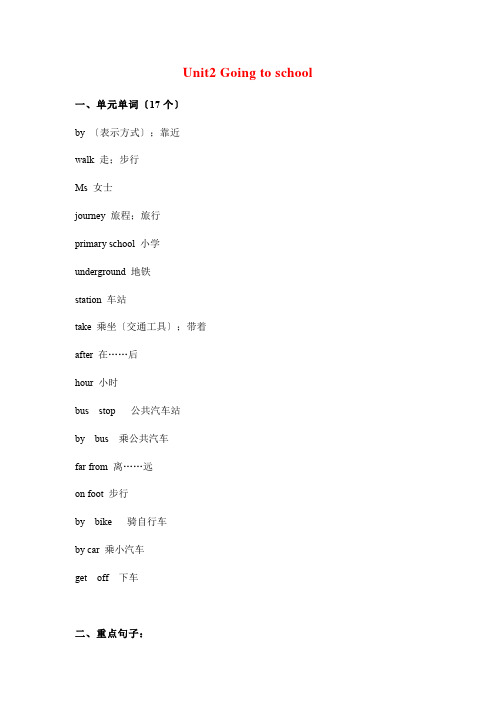
Unit2 Going to school 一、单元单词〔17个〕by 〔表示方式〕;靠近walk 走;步行Ms 女士journey 旅程;旅行primary school 小学underground 地铁station 车站take 乘坐〔交通工具〕;带着after 在……后hour 小时bus stop公共汽车站by bus乘公共汽车far from 离……远on foot 步行by bike骑自行车by car 乘小汽车get off下车二、重点句子:Listen and sayHow do you come to school, Joe?乔,你怎么去上学?I come to school by bus.我乘公共汽车去上学。
I live far from our school.我家离学校很远。
How do you come to school, Alice?你怎么去上学,爱丽丝?I come to school on foot.我步行上学。
I live near school.我住在学校附近。
How do you come to school, Kitty?你怎么去上学,凯蒂?I come to school on foot, too.我也步行上学。
Alice and I walk to school together.爱丽丝和我一起走路上学。
What about you, Peter?你呢,彼得?How do you come to school?你怎么去上学?I come to school by bus.我乘公共汽车来上学。
Look and readMs Guo’s journey to work郭女士的上班旅程Ms Guo is a teacher at Happy Primary School.郭女士是幸福小学的一名教师。
She lives on Green Street.她住在格林街。
译林版三年级下册 Unit2(含中文翻译)

Unit 2 In the library 在图书馆Story timePage12-13 ①Hello, Yang Ling. 你好,杨玲。
Shh! Don’t shout, Liu Tao. 嘘!不要吵,刘涛。
②Don’t run. Liu Tao. 不要跑,刘涛。
③Would you like a sweet, Yang Ling? 你要来块糖吗,杨玲?No, thank you. Don’t eat here. 不,谢谢,别在这里吃东西。
④Don’t shout . Don’t run. Don’t eat. 不要大喊。
不要跑。
不要吃东西。
⑤Shh! Don’t talk.嘘,别说话。
⑥Don’t sleep, Liu Tao不要睡觉,刘涛。
⑦I’m sorry. 对不起。
单词:shout 大喊eat 吃 run跑 talk 说话sleep 睡觉drink 喝Cartoon time ①Hello, Bobby! Don’tshout! ②Don’t eat mycake! ③Don’t drink my milk!④What’s this单词in 在……里 library图书馆Shh 嘘shout 喊;叫run 跑;跑步eat 吃here 这里;在这里talk 说话;谈话sleep 睡觉 drink 喝milk 牛奶 English 英语your 你的,你们的重点内容词汇分类动词:shout 喊;叫run 跑;跑步eat 吃talk 说话;谈话sleep 睡觉drink 喝其他: in在....library 图书馆shh 嘘here 这里;在这里milk 牛奶 English 英语your 你的;你们的短语don't shout 不要喊don't run 不要跑 don't talk不要说话don't eat 不要吃 don't sleep不要睡觉惯用表达式1. Thank you. 谢谢你。
二年级英语下册素材-Unit 2 Dinner is ready课文翻译 译林版(一起)
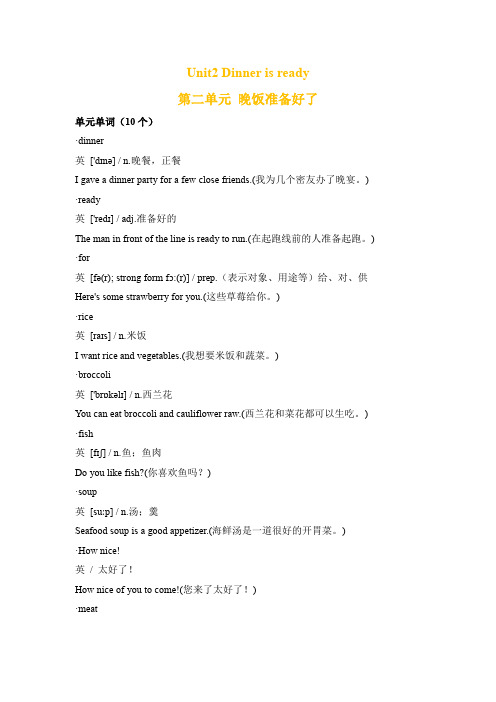
Unit2 Dinner is ready第二单元晚饭准备好了单元单词(10个)·dinner英['dɪnə] / n.晚餐,正餐I gave a dinner party for a few close friends.(我为几个密友办了晚宴。
)·ready英['redɪ] / adj.准备好的The man in front of the line is ready to run.(在起跑线前的人准备起跑。
)·for英[fə(r); strong form fɔ:(r)] / prep.(表示对象、用途等)给、对、供Here's some strawberry for you.(这些草莓给你。
)·rice英[raɪs] / n.米饭I want rice and vegetables.(我想要米饭和蔬菜。
)·broccoli英['brɒkəlɪ] / n.西兰花You can eat broccoli and cauliflower raw.(西兰花和菜花都可以生吃。
)·fish英[fɪʃ] / n.鱼;鱼肉Do you like fish?(你喜欢鱼吗?)·soup英[suːp] / n.汤;羹Seafood soup is a good appetizer.(海鲜汤是一道很好的开胃菜。
)·How nice!英/ 太好了!How nice of you to come!(您来了太好了!)·meat英[miːt] / n.肉类I want some meat and potatoes.(我想要一些肉和土豆。
)·noodles英[ˈnu:dlz] / n.面条I want noodles.(我想吃面条。
)课文翻译Pages10-11 Story time10-11页故事时间What’s for dinner, Dad?晚饭吃什么,爸爸?Rice, broccoli and fish.米饭,西兰花和鱼。
- 1、下载文档前请自行甄别文档内容的完整性,平台不提供额外的编辑、内容补充、找答案等附加服务。
- 2、"仅部分预览"的文档,不可在线预览部分如存在完整性等问题,可反馈申请退款(可完整预览的文档不适用该条件!)。
- 3、如文档侵犯您的权益,请联系客服反馈,我们会尽快为您处理(人工客服工作时间:9:00-18:30)。
Unit2共 78 个单词Marco Polo['pəuləu]马可·波罗latitude['lætitju:d]n.纬度voyage['vɔiidʒ]n.航海;航行mercy['mə:si]n.仁慈;宽恕;怜悯at the mercy of[æt ðəˈmɜ:sɪɒv]受……支配encyclopedia[en,saikləu'pi:djə]n. 百科全书 alongside[ə'lɔŋsaid]prep.靠着;沿着 adv.在旁边,沿着边exploration[ɪk'splɔ:reiʃn]n.探险;探测minimum['mɪnɪməm]adj.最小的;最低的celestial[si'lestjəl]adj.天上的pole[pəul]n.地极;柱;杆equator[i'kweitə]n.赤道horizon[hə'raizən]n.地平线;视野overhead['əʊvəhed]adj.在头上的seaweed['si:wi:d]n.海草;海藻nowhere['nəʊhweə]adv. 离岸的;海面上的outward['autwəd]adj.外面的;向外的tide[taid]n.潮;潮汐;潮流;趋势secure[si'kjuə ]adj.安全的;可靠的knot[nɒt]n.结 vt.打结 log[lɔg]n.原木;木材;航行日志 nautical['nɔ:tikəl]adj.海上的;航海的 nautical mile['nɔ:tikəl mail]海里magnetic[mæɡˈnetɪk]adj.磁的;有磁性的bearing circle['bεəriŋ 'sə:kl]方位圆random['rændəm]adj.任意的;随便的astrolabe['æstrəleib ]n.古代的天体观测仪;星盘 awkward['ɔ:kwəd]adj.难使用的;笨拙的reference['refrəns]n.参考quadrant['kwɔdrənt]n. 象限;四分仪precise[pri'sais]adj.精确的;准确的simplify['simplifai]vt单一化;简单化portable['pɔ:təbl]adj.轻便的;手提的;便携的 shortcoming['ʃɔ:tkʌmɪŋ]n.缺点;短处sextant['sekstənt]n.六分仪update[ʌp'deit]vt.更新tendency['tendənsi]n.趋向;倾向reliable[ri'laiəbl]adj.可靠的;可信赖的Samuel['sæmjuəl]塞缪尔swoop[swu:p]vi.突降;猛扑parcel['pɑ:səl]n.小包;包裹peck[pek]vt.&vi.啄食cliff[klɪf]n.悬崖;峭壁expedition[,ekspi'diʃən]n.远征;探险(队)compulsory[kəm'pʌlsəri]adj.必须做的;必修的 reform[ri'fɔ:m]n.改革;革新survival[sə'vaivəl]n.生存;幸存Captain Bligh['kæptin blai]布莱船长Tahiti[tɑ:'hi:ti]n. 塔希提岛(位于南太平洋)incident['insidənt]n.事件;事变departure[di'pɑ:tʃə]n.出发;离开crew[kru:]n.(轮船、飞机等上的)工作人员,(工作)队deposit[di'pɔzit]vt.放;(把钱)存入银行dilemma[di'lemə]n.进退两难的局面drawback['drɔ:bæk]n.缺点;障碍dusk[dʌsk]n.薄暮;黄昏routine[ru:'ti:n]n.常规;日常事务reckon['rekən ]Vt.计算;估计reckoning['rekəniŋ]n. 计算;估计starvation[stɑ:'veiʃən]n.挨饿;饿死psychology[sai'kɔlədʒi]n.心理学psychologically[,psaikə'lɔdʒikəli]adv.心理上地;心理学地tension['tenʃən]n. 紧张;不安;张力gradual['grædjuəl]adj.逐渐的;逐步的gradually['grædjuəli]adv.逐渐地;逐步地foresee[fɔ:'si:]vt.预见;预知thirst[θɜ:st]n.渴;口渴Timor['ti:mɔ:]帝汶岛(位于东南亚)set loose[set lu:s]出发;开始tear[tɪə; teə]vt扯破;撕破hardship['hɑ:dʃip]n.困苦;艰难jaw[dʒɔ:]n.颚;颌;下巴jaws of death[dʒɔ:z ɔv deθ]鬼门关;死神Greenland['ɡri:nlənd]格陵兰(位于北美洲东北部,世界第一大岛)Shetland Islands['ʃetlənd 'ailənds]设得兰群岛(位于英国苏格兰北部)the Faroe Islands[ði feərəu 'ailənds]法罗群岛(位于丹麦北大西洋)roar[rɔ:(r)]Vt&Vi.咆哮;轰鸣background['bækgraund]n.背景;后台选修九Unit2 Sailing the oceans海洋航行We may well wonder how seamen explored the oceans before latitude and longitude made it possible to plot a ship's position on a map. 我们很可能感到奇怪,在经纬度被用来在地图上标出船只位置之前,海员是如何对海洋进行探索的。
The voyages of travellers before the 17th century show that they were not at the mercy of the sea even though they did not have modern navigational aids. 17世纪以前的航海纪录显示,即使没有现代航海技术的帮助,他们也没有任凭海洋摆布。
So how did they navigate so well? Read these pages from an encyclopedia. 那么,他们是怎样航行得如此之好的呢?读读百科全书这几页上的记载吧。
Page 1: 第一页:Using nature to help Keeping alongside the coastline借助大自然使船只沿海岸线行驶This seems to have been the first and most useful form of exploration which carried the minimum amount of risk. 这似乎已是最早的、最有用的探险方式,所冒的风险也最小。
Using celestial bodies利用天体●North Star北极星At the North Pole the North Star is at its highest position in the sky, but at the equator it is along the horizon. 在北极,北极星是在天上的最高位置;而在赤道上,北极星却在地平线上。
So accomplished navigators were able to use it to plot theirpositions. 因此,熟练的航海探险家就能够利用北极星来确定他们自己的位置。
●Sun太阳On a clear day especially during the summer the sailors could use the sun overhead at midday to navigate by. They can use the height of the sun to work out their latitude. 在晴朗的日子里,特别是夏天,船员可以利用正午在头顶上的太阳来导航,他们可以用太阳的高度来计算出他们的纬度。
●Clouds云层Sea captains observed the clouds over islands. There is a special cloud formation which indicates there is land close by. 海上的船长观测岛上的云层。
有一种特殊的云彩的形状表明附近有陆地。
Using wildlife利用野生动植物●Seaweed海藻Sailors often saw seaweed in the sea and could tell by the colour and smell how long it had been them. 海员常常看到海里的海藻,并能根据它的颜色和气味判断这种海藻在那儿有多久了。
If it was fresh and smelled strongly, then the ship was close to land. 如果它颜色新鲜而且气味浓烈,那说明船只就离陆地很近了。
●Birds鸟Sea birds could be used to show the way to land when it was nowhere to be seen. 在看不见陆地的时候,可以用海鸟来指明通往陆地的去路。
In the evening nesting birds return to land and their nests. 在夜晚的时候,筑巢而居的鸟就要返回陆地鸟窝。
So seamen could follow the birds to land even if they were offshore and in the open sea. 因此,即使在远离海岸的大洋上,海员们也可以跟随这些鸟到达陆地。
